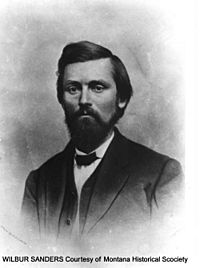Wilbur F. Sanders facts for kids
Quick facts for kids
Wilbur Fisk Sanders
|
|
|---|---|

Wilbur Fisk Sanders, Senator of Montana. He was the prosectuting lawyer for the "Road Agents" in Virginia City, Montana.
|
|
| United States Senator from Montana |
|
| In office January 1, 1890 – March 3, 1893 |
|
| Preceded by | None |
| Succeeded by | Lee Mantle |
| Personal details | |
| Born |
Wilbur Fisk Sanders
May 2, 1834 Leon, New York, U.S. |
| Died | July 7, 1905 (aged 71) Helena, Montana, U.S. |
| Resting place | Forestvale Cemetery, Helena, Montana |
| Political party | Republican |
| Spouse | Harriet P. Fenn |
| Children | James, Wilbur E., and Louis |
| Occupation | Lawyer, politician |
| Profession | Law |
| Signature | |
| Military service | |
| Years of service | 1861-1862 |
| Rank | First Lieutenant |
| Unit | 64th Ohio Infantry |
| Battles/wars | Battle of Shiloh |
Wilbur Fisk Sanders (born May 2, 1834 – died July 7, 1905) was an important United States senator from Montana. He was a pioneer and a very good lawyer. Sanders helped a lot in building up Montana Territory and shaping Montana's early government.
Contents
Early Life and Education
Wilbur Fisk Sanders was born in Leon, New York, on May 2, 1834. His parents were Ira and Freedom Sanders. His father was a farmer from Rhode Island, and his mother was from Connecticut.
Wilbur's father was a religious man. He named his first son after Willbur Fisk, a leader in his faith. Wilbur was a smart and hardworking child. He went to school in New York and later became a teacher himself.
In 1854, Sanders moved to Akron, Ohio. He continued teaching there. He also started studying law with his uncle, Sidney Edgerton. His uncle was a big influence on him.
Sanders became a lawyer in 1856. He and his uncle then started a law firm together. His uncle was involved in the Republican Party. Sanders followed his uncle's political path.
On October 27, 1858, Sanders married Harriet P. Fenn. She was from Ohio. They had five children, but only three lived to be adults: James, Wilbur E., and Louis.
Civil War Service
During the American Civil War, Sanders helped gather soldiers in 1861. He formed a company of infantry and a battery of artillery. He was made a first lieutenant in the 64th Ohio Infantry.
Sanders fought in the Battle of Shiloh. Later in 1862, he helped build defenses for railroads near Nashville. His family said he left the army in August 1862. This was because he became ill and had an injury. He then went back to his family in Akron, Ohio.
Life in Montana Territory
In 1863, Sanders moved to what would become Montana. He settled in Bannack, Montana. He worked as a lawyer there. He also became interested in mining and raising livestock.
Sanders was one of the first people to settle permanently in Montana. He helped bring law and order to the area. He was a prosecutor for the Montana Vigilantes. This group worked to stop crime when there were no official courts.
In December 1863, Sanders led the case against George Homer Ives. This trial helped start the work of the Vigilantes. They helped stop thefts and other crimes by "road agents" in the Virginia City, Montana area. Sanders was one of the five people who started the Alder Gulch Vigilance Committee.
As a lawyer, Sanders was known for defending people from minority groups. This included Chinese and Native American people. In 1881, he defended two Chinese miners, Ah Wah and Ah Yen. They were on trial for a serious crime. Sanders argued that there was not enough proof. The Montana Territorial Supreme Court agreed and they were found not guilty.
In 1873, Sanders became a member of the Territorial Legislature. This was like the local government. He also understood how important it was to save old records. For 30 years, he was the president of the Montana Historical Society. He collected old newspapers and documents in his law office.
Sanders also helped start the Society of Montana Pioneers. He served as its secretary in 1884 and president in 1888. He ran for United States Representative several times. He was also a member of Montana's Territorial House of Representatives from 1873 to 1879.
Becoming a U.S. Senator
When Montana became a state, Sanders was elected as a Republican to the U.S. Senate. He served from January 1, 1890, to March 3, 1893. While in the Senate, he led the Committee on Enrolled Bills.
In the 1890s, Sanders also represented the Chinese community in Butte, Montana. He helped them when labor unions were boycotting Chinese businesses.
Wilbur Fisk Sanders passed away in Helena, Montana, at age 71. He was buried in Forestvale Cemetery there. Sanders County, Montana, is named in his honor.
 | Georgia Louise Harris Brown |
 | Julian Abele |
 | Norma Merrick Sklarek |
 | William Sidney Pittman |

